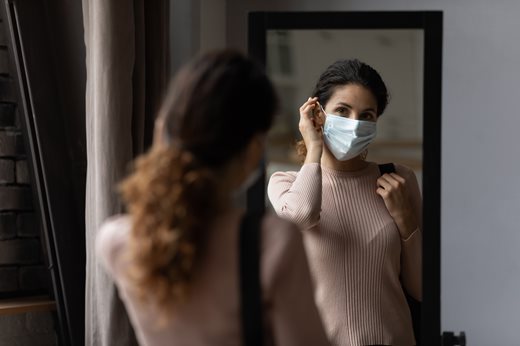
Some people are experiencing long-term symptoms, weeks after testing positive for the coronavirus. These symptoms, more commonly referred to as "long Covid" or "Post-COVID syndrome," is a condition in which a person experiences symptoms of COVID-19 after the body clears the virus out of its system. Long COVID is classified as a post-COVID condition described by the CDC as a new, retuning, or ongoing health problem more than a month after infection.
Think of that slow recovery back to normal after being sick with the flu or another illness. It may take a few days post-infection to feel your energy levels go back to normal. Another way to describe the feeling is similar to feeling jet-lagged and not thinking clearly because you felt so tired before adjusting to a new time zone. Some reports of long COVID are like having these feelings but never returning to normal.
As of now, there is no data to explain who is most at risk to develop long COVID symptoms. These symptoms can occur in people hospitalized with COVID-19 or those who only experience a mild case of COVID-19. Even if you test positive for the coronavirus, you may only develop mild, moderate, or no symptoms at all. The CDC and experts worldwide are researching the short- and long-term health effects of COVID-19, who experiences them, and why.
What are the symptoms?
Many symptoms of long COVID are what you would expect from being infected with the coronavirus for the first time. Many individuals specifically complain of feeling brain fog or not being able to think clearly. People feel sluggish, fuzzy, and tired.
People who recovered from severe cases of COVID-19 and were hospitalized may experience other problems due to the permanent damage that occurred in their lungs, heart, kidney, or other organs. People with long COVID report experiencing different combinations of the following symptoms:
- Tiredness or fatigue
- Difficulty thinking or concentrating (sometimes referred to as "brain fog")
- Headache
- Loss of smell or taste
- Dizziness on standing
- Fast-beating or pounding heart (also known as heart palpitations)
- Chest pain
- Difficulty breathing or shortness of breath
- Cough
- Joint or muscle pain
- Depression or anxiety
- Fever
- Symptoms that get worse after physical or mental activities
What can help alleviate long COVID symptoms?
The first thing you should do is talk to your doctor if you feel you are experiencing these symptoms. Some medical professionals have reported that long COVID symptoms have improved after being vaccinated, but more studies are needed to determine the effects. Some helpful lifestyle changes you can make to alleviate symptoms include:
- Incorporate body movement into your day, and depending on your symptoms, start slow. This can include slow aerobic exercises, basic yoga, or going on a walk. Most experts recommend 30 minutes of exercise, five days a week, to improve brain health.
- Eat a healthy diet with anti-inflammatory foods like olive oil, fruits and vegetables, nuts and beans, and whole grains. Avoid substances like drugs and alcohol.
- Aim to get enough sleep each night to help heal your brain and body.
- Participate in stimulating social activities that will benefit your mood and help your memory.
- Practice mindfulness to relax your mind and limit daily stress.